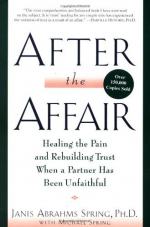
|
| Name: _________________________ | Period: ___________________ |
This test consists of 5 multiple choice questions, 5 short answer questions, and 10 short essay questions.
Multiple Choice Questions
1. For trust to be regained in a relationship, what must happen?
(a) The affair must be analyzed from all angles.
(b) The hurt partner must have an affair as well.
(c) The lover must be involved in couples counseling.
(d) The root causes of the affair must be eliminated.
2. How do unfaithful partners typically manage their anxiety?
(a) Disengage from the marriage even further.
(b) Become involved in a wide range of activities.
(c) Attempt to understand the feelings of the hurt partner.
(d) Arrange to see their lover more frequently.
3. What is the first step in post-affair healing?
(a) Discovering the identity of the lover.
(b) Managing emotions until feelings can normalize.
(c) Making an appointment to see a marriage counselor.
(d) Discussing the secret nature of the affair.
4. The unfaithful partner may experience physical changes from romantic love that can be expected to last how long?
(a) A short time.
(b) Throughout the affair.
(c) The rest of their life.
(d) When they're with their lover.
5. If the disenchantment felt in an aging relationship is mismanaged, it can lead to which result?
(a) Jealousy and anger.
(b) An extramarital affair.
(c) Temporary separation.
(d) Bitterness and resentment.
Short Answer Questions
1. An affair, as described by the book, may not always include which behavior?
2. Both partners should listen in which way?
3. The feeling of romantic love can lead the unfaithful partner to take which action?
4. According to Chapter 3, how should irrational or erroneous thoughts should be treated?
5. When the relationship with the lover is ended by the unfaithful partner, which emotion typically follows?
Short Essay Questions
1. What is the fundamental situation of any marriage post-affair which is addressed by Chapter 4?
2. How is the presence of violent thoughts in the hurt partner related to the discovery of the affair?
3. Why do family members find it difficult to support a hurt partner during their time of crisis after the discovery of an affair?
4. What steps does the author take to minimize emotionally-charged labels associated with the affair?
5. How does the text address gender-typical reactions in Chapter 1?
6. Why do couples often feel they are incompatible?
7. What is the fundamental difference in reactions between the hurt and unfaithful partners to the discovery of an affair?
8. Why could an unfaithful partner feel a lack of guilt about the affair?
9. Where do unrealistic expectations of love and marriage come from?
10. How does the presence of children in a marriage affect the unfaithful partner in regards to the affair?
|
This section contains 893 words (approx. 3 pages at 300 words per page) |

|




